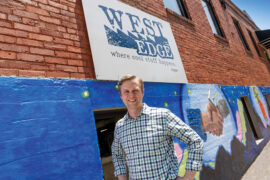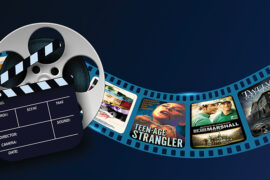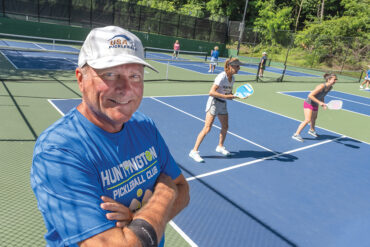United Way of the River Cities Director Carol Bailey, along with her staff, volunteers and donors, have stepped up to help those affected by the COVID-19 pandemic.
By Jean Hardiman
HQ 110 | SUMMER 2020
United Way of the River Cities has gone around doing good deeds in the Tri-State for years. It’s been pooling resources and making the most out of the community’s generosity to fight poverty, hunger, homelessness, substance use disorder and so much more.
But of all the good that it’s done since Carol Bailey took the helm as executive director in April 2018, the accomplishment that brings her the most pride is the way the United Way staff and organization rallied to make big things happen when the fallout of the COVID-19 pandemic hit this region in the spring.
“We came together very quickly to pull funds together. We’ve worked to raise over $160,000 in this time of economic upheaval, and we devised a very quick, efficient process for evaluating applications for that fund,” she said. “We have a very fast turn-around time.”
Much of the credit goes to a community with the defining trait of working in tandem when it counts the most, said Bailey, a native of Queens, New York, who moved to the Tri-State at 16 when her father came to run a clothing factory in Olive Hill, Kentucky.
“One of the greatest strengths this community has is its ability to pull together and work together to try to solve a problem,” she said.
It takes a lot of people to identify and find solutions for difficult circumstances at any given time in any given community, but Huntington delivers. Plus, the word “united” is in her organization’s title for a reason, she said.
“It has to do with different groups having come together way back in the late 1800s when United Way was founded,” she said. “They knew that different entities had different resources; but if you put them all together, they would be able to effect more significant change and find a way to come up with an answer to whatever that problem might be.”
Bailey’s familiarity with diverse organizations is not new to her since joining United Way. It’s been developing along with her diverse professional and volunteer career. A Vinson High School and two-time Marshall University graduate, Bailey’s first job was at Time Out Youth Shelter before working in the substance abuse residential treatment unit at Prestera Center. She worked in the intake department at Prestera for a few years before taking a break from her professional career to raise her daughters. But she volunteered in her daughters’ school PTO, at the Huntington Museum of Art and as a CASA (court-appointed special advocate) for children in the court system. Her work at the museum led to a job in its education department, which eventually became a 19-year career there, finishing as director of development.
She enjoyed her experience there, just as she has enjoyed making a difference through United Way. And one of the best things about working for United Way, Bailey said, is that even with the difficult circumstances she sees in the community, there is always optimism.
“There is a lot of positivity that you find in a role like this,” said Bailey, who now has two grown daughters with her husband, psychologist Brian Bailey, and is a grandmother as well. “That might surprise you, but when you look at all the work that United Way does and how we pull volunteers together, you hear so many positive, uplifting comments from folks who are excited about the improvements and progress being made in the community. There is a lot of optimism.
“I think the fact that so many people — individuals, businesses, corporate entities, foundations — give us money is a sign of optimism about the future. They’re investing in the community to try to make things better. I just find that to be a really optimistic thing.”
That includes the nuanced and rapidly changing backdrop that comes with the COVID-19 pandemic, which for United Way has meant an extra layer on top of the regular duties the organization has continued to perform.

“We’ve tried to be very nimble so that we could really focus on issues that are specific to COVID,” Bailey said. “There was increased need because of the fallout from COVID, and we wanted to respond to what needs we saw here in our community, as opposed to what national trends were. We positioned ourselves very quickly to be able to try and help.”
The funds raised by United Way of the River Cities have gone to provide microgrants to other nonprofits throughout Cabell, Lincoln, Mason and Wayne counties in West Virginia and Lawrence County, Ohio. These grants have helped stock pantries with food and hygiene and cleaning products, fund emergency shelter needs, provide personal protective equipment and meet other COVID-19 relief needs.
 United Way has been instrumental in getting masks into our community. Microgrants awarded to Lesage Lions Club and Junior League of Huntington allowed nearly 5,000 to be sewn and distributed to local nonprofits with the help of WV Quilt Shop. Through a grant awarded to United Way from the AEP Foundation, nearly 12,000 cloth and disposable masks have been purchased and distributed at hubs like the local public libraries and homeless shelters. These masks, and others purchased through microgrants and other COVID-19 relief funding, have allowed nearly 30,000 masks to be distributed.
United Way has been instrumental in getting masks into our community. Microgrants awarded to Lesage Lions Club and Junior League of Huntington allowed nearly 5,000 to be sewn and distributed to local nonprofits with the help of WV Quilt Shop. Through a grant awarded to United Way from the AEP Foundation, nearly 12,000 cloth and disposable masks have been purchased and distributed at hubs like the local public libraries and homeless shelters. These masks, and others purchased through microgrants and other COVID-19 relief funding, have allowed nearly 30,000 masks to be distributed.
“So, there are some things we’re doing that are very specific to the need around COVID. Who would have thought we’d all need to be wearing masks?” she said. “If there’s a need, we try to help fill it — in addition to our regular duties.”
In the meantime, United Way has also been trying to continue with its newer projects, such as helping homeless youth. Some projects have had to be flexible because of the pandemic, but Bailey’s team and volunteers have proven to be good at being flexible.
“We’re continuing with things we normally do,” she said. “The pandemic has changed all of our lives, but we will not allow it to stop us from doing our regular work. We’re just stepping up our game, working harder and finding more good works to do.”





